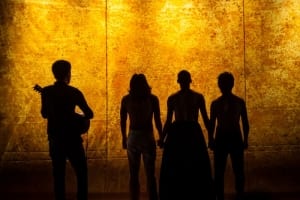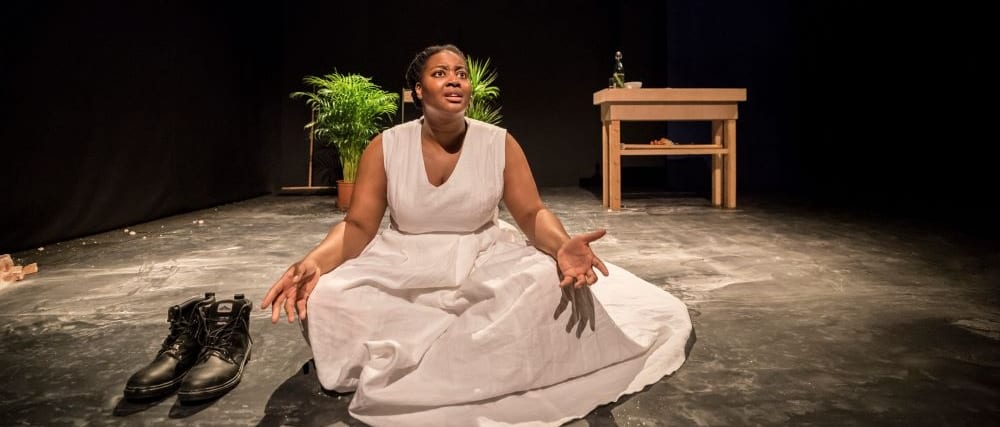The Public Theater has long since established its reputation as a haven for up-and-coming artists and theatrical productions, from their regular season offerings to their now-iconic Shakespeare in the Park and its community outreach counterpart, the Mobile Unit. The Under the Radar Festival, which is in its sixteenth year, is a celebration of new art and is meant to act as a sort of weather vane for the future of theater. The Public Theater states that “these artists provide a snapshot of contemporary theater: richly distinct in terms of perspectives, aesthetics, and social practice, and pointing to the future of the art form.”
Though each show in the lineup comes with its own intentions, methods, and origin story, a few common themes arise. The most obvious is the internationality of the selections. This year’s theater companies and actors hail from Mexico, China, Palestine, Chile, and the UK, among others. Artists from abroad and at home alike tap into unique cultural perspectives which carry an undeniable resonance with an American audience. More broadly, though, and more difficult to define, is the undercurrent of resistance which seems to run through each festival offering, manifesting in a myriad of ways but nevertheless leaving one (one who might have seen seven shows in as many days) with a overarching message about the human capacity – and necessity – to resist.
Take, for example, The Shadow Whose Prey the Hunter Becomes, in which a group of intellectually disabled people hold a forum which serves to instruct, remind, warn, and yes – resist the limitations of the roles that society allows them. In Beijing-based Théâtre du Rêve Expérimental’s production of Constellations, the protagonists push back against a multiverse of possible timelines in which they are kept apart from each other. In Grey Rock, a troupe of Palestinian-identifying actors explore just how high a dream – or a rocket – can go when imbued with the hopes of a collective people.
Australian production The Shadow Whose Prey the Hunter Becomes is “a story about a public meeting, the type of meeting you would hope to happen in a certain kind of democracy.” Its genesis gives this public meeting a real urgency. Directed and co-authored by Bruce Gladwin, this play features four actors with intellectual disabilities who were integral to the writing of the script. The actors launch into a fictional “public meeting” that we soon begin to realize isn’t so fictional after all. When actors Scott, Sarah, Michael, and Simon tell us that we need to pay more attention, to listen closer, it becomes clear that they are not really acting at all. They are trying to convey a truth that we haven’t caught on to yet. As Scott says three-quarters of the way through the show: “They just aren’t getting it.” To have four intellectually disabled actors on such a prestigious stage as the Public Theater, talking about abuse and awareness of intellectually disabled people, may seem progressive. But a clear signal of just how a modern audience responds to such progressiveness was revealed by the audience the night I was there. Actor Scott – wearing a shirt that says “Autism Pride” – breaks away from the main narrative to lament that people laugh at him when he talks because of his speech. Is this scripted, or a break in the fourth wall? Our audience had been doing exactly that: laughing at Scott’s every line, when there was no possible punchline but his way of speech. But even with all this, the four actors are not here to chastise us: they are here to inform us, and to warn us. The four actors, who have all mastered a fine balance between gravity and excellent comedic timing, take us through the systemic abuse and enslavement of intellectually disabled people, and they engage us in a conversation about the future of AI and its capacity leave us behind, to render the entire human population intellectually disabled. Their argument is so earnest and compelling that it will stay with you for long after you’ve left the theater.
Susan, an American production by Ahamefule J. Oluo, has one foot at home and one abroad. Between soulful original modern jazz compositions (in which Oluo himself joins the band to play his trumpet) Oluo performs stand-up comedy, chronicling two time periods: his mother’s journey as a white single mother of two biracial children, and the answers he sought as an adult when he finally visited the home of the father he had never met in Nigeria. Stories of growing up in Section 8 housing in Seattle, or his own admittance of failures as a parent, or his reconciling with racism and gentrification as a black man in Seattle are punctuated with explosions of room-filling music featuring two fantastic singers, okanomodé and Tiffany Wilson. And though Oluo’s composition is in part a tale of soul-searching, its essence (true to its name) is an homage to his mother, Susan Oluo. Having given up her dreams of becoming a professional singer as she worked to support two kids, Ahamefule J. Oluo ends his show in the only way he could have – by giving his mother her own limelight. Susan herself closes the performance with a rendition of “Send in the Clowns,” a song which Oluo recounts once won her a much-needed $50 in a karaoke competition. And she brings the house down. It cannot be lost on anyone that this woman who gave up her hopes for a career of singing professionally is nevertheless here in New York City, singing to packed audiences at the Public Theater to a standing ovation as the jewel of a show that was created about her, for her by her son.
Amir Nizar Zuabi’s Grey Rock is a Palestinian play commissioned by American-based Remote Theatre Project, a group dedicated to supporting “theater artists who are isolated either geographically or politically…to develop new work, tour internationally and have their voices heard outside the confines of their region.” Unusually, the plot revolves around the moon – or more specifically, one Palestinian man’s quest to make a rocket that will go to the moon. It sounds ludicrous, and that’s what all the people in Yusuf’s life think – until he wins them over, one by one, and captivates the world while doing so. Yusuf (Khalifa Natour), who is grieving his late wife, locks himself in his shed until his daughter Lila (Fidaa Zaidan) forces her way into his space out of concern. She finds her worst fear: a project that could get her father and everyone around him arrested The peace that had been struck between them since the death of Lila’s mother evaporates, and Lila finally reveals to her father that she still resents him for being in jail for five years of her childhood “because he has principles.” But in the end, Lila can’t resist – she gives into her father’s dream because she is a dreamer too. Yusuf looks back at the American moon landing with nostalgia for his wife (whose hand he held for the first time that night, in the excitement of the moment) and with a fierce conviction – that if only he can get to the moon, Palestine can show the world that they can do anything. The actors attack their parts with an admirable intensity, but their English sometimes stumbles; given the success of the other festival productions in cleverly-incorporated subtitles, one can’t help but wonder if Grey Rock would have landed a little better if it had been performed in the actors’ native language.
In my opinion, there were two standout productions: Héctor Flores Komatsu’s Andares, and Selina Thompson’s salt. Andares, created by Mexican-based Makuyeika Colectivo Teatral, weaves a fantastic tapestry of indigenous Mexican mythology, language, and culture, while also crying out against an all-too-current ongoing struggle against the demonization of Mexican people by their neighbors to the north. salt., a production hailing from England, is the story of one woman’s existential journey to make art out of the all-consuming racism pervading Europe – a journey that took her to the Gold Coast of Africa, to Jamaica, and briefly to the US, re-tracing the steps of the Atlantic slave trade and African diaspora.

Andares is performed by three actors and a musician (who we later learn is of the Son Jarocho tradition) playing a small guitar (which we later learn is a jarana). Opening with a Spanish language ballad about missing the homeland and supported throughout by the tireless Raymundo Pavón Lozano, the three actors (Josué Maychi, Domingo Mijangos, Lupe de la Cruz) take us through intertwining narratives about indigenous culture in Mexico. The entire presentation is dreamlike. A fire-bright background sets the scene for creation myths; stories from modern Zapotec, Wixáritari, and Mayan culture are told in bits, in between ancestral legends of a blue stag, grandmotherly anecdotes about hummingbirds, and the ostensibly sacred quality of tortillas.
The actors are spirited, inspired performers, each one of them a joy to watch in performance. They are natural storytellers, embodying the joy and the tragedy of their individual narratives. Mijangos takes us through the culture of and personal experiences as a muxe, a third-gender person in Zapotec culture. De La Cruz tells us about the spiritual significance of hikori (or as we call it, peyote) for the Wixáritari people, and Maychi dreams about his father’s maize farm and grandmother’s proud Mayan heritage. Some stories are celebratory – there is a scene in which the music goes into full swing, we all start to clap, and dancing ensues. But a vein of sorrow and anger, compounded by generations of sorrow and anger, runs through the show. Even indigenous traditions are celebrated, there is a constant resistance necessitated by mere existence in a Westernized Mexico. From an ancient legend about the deer who foresaw the invasion of indigenous Mexico (giving it perpetually watery eyes) to a fantastically crescendoing cry against the oppression of the modern-day Mexican people, the impact of centuries of colonialism and imperialism is inescapable. Andares is an homage to indigenous Mexico, crafted with stunning aestheticism and overflowing with passion.

But the production which I will carry away with me from the 2020 Under the Radar Festival is Selina Thompson’s salt.: a brutal and beautiful rendering of the author’s true-life journey in retracing the triangle of the transatlantic slave trade. Brought to life with quiet dignity by Rochelle Rose, who is priestess-like in a floor-length white dress, the tone with which salt is performed almost mimics the waves of the Atlantic Ocean – a major fixation for the author paying homage to the millions of Black lives lost, literally and figuratively, over those waters. Rose performs in the first tense, speaking as Thompson herself. She begins in a calm, almost instructive tone, setting the scene for the momentous journey ahead, and takes us deftly through Thompson’s vulnerability, anger, hopelessness, and resistance as she fights back against everything the world throws at her, a Black woman descended from Caribbean parents and grandparents. “Europe pushes against me. I push back,” she repeats, recounting with unflinching honesty her personal experiences with racism. She hefts a sledgehammer and smashes a giant piece of rock salt to bits with such conviction and power that we have been provided with mandatory safety goggles. She stands with her feet in the smashed crystals of salt to relay the next leg of the journey. At one point, the lights go up, and our narrator takes a well-deserved break from a devastating monologue to survey the audience, each one of us, making eye contact and sizing us up.
We follow Thompson from Birmingham, UK, to Ghana via cargo boat, to Jamaica, to North Carolina, before she sets back across the wide, unforgiving expanse of the Atlantic. The final monologue, set in the middle of the ocean, is performed by Rochelle Rose with such beauty and power that the poetry takes over what we see with our own eyes, and it’s almost as if she truly is suspended dreamlike in the Atlantic Ocean, exactly as she describes, illuminated from behind by a divine light. Even just thinking back on it now sends goosebumps spreading up my arms. It is said that art should comfort the afflicted and afflict the comfortable, and Thompson, recording a personal journey which resonates anywhere touched by the African diaspora, does just that.

